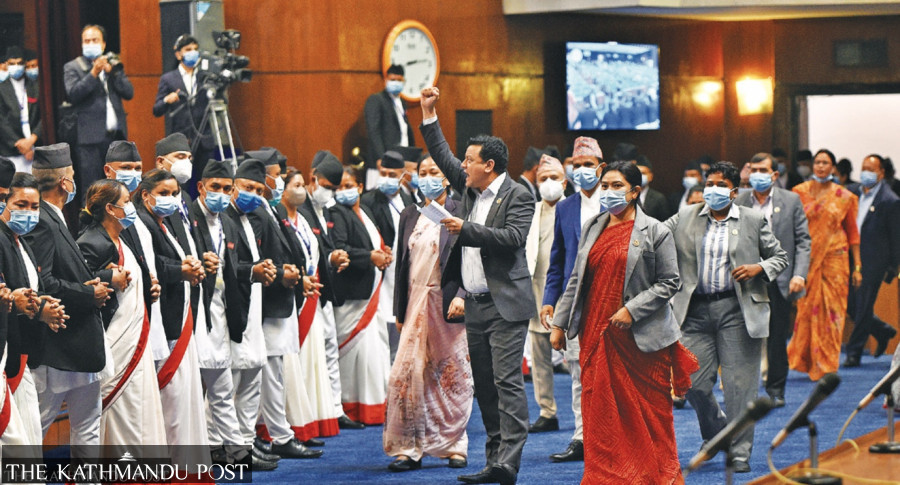Politics
On MCC compact, UML tells the international community one thing and the public another
Experts say it will be hypocrisy for the UML to claim it wasn’t part of the compact ratification process.
Binod Ghimire
After the CPN (Maoist Centre), it is the main opposition CPN-UML which is showing duplicity with regard to the Millennium Challenge Corporation Nepal Compact ratified by the House of Representatives last month.
At the UML’s Parliamentary Party meeting on Wednesday, the leadership directed the lawmakers to tell the public that it had no involvement in ratifying the MCC compact. It also asked lawmakers to inform the people that the $500 million American grant agreement was tabled by the KP Sharma Oli government just because it was an inheritance from the predecessor government, which had signed the compact with the United States.
“We were not involved in the ratification process. We will tell people the fact,” Khagaraj Adhikari, a lawmaker from the party, told the Post. “Our government had tabled the MCC compact in Parliament because it was our duty as a successor to the previous government that signed the deal.”
When the MCC compact was put to a vote on February 27, the UML was obstructing the House just as it had been doing since September-October.
During the voice vote, the UML did not participate, while the Nepali Congress, the Maoist Centre, the Unified Socialist and the Janata Samajbadi Party voted to ratify the compact.
In a press conference two days later, the UML did not object to the ratification but had expressed its reservations about the process. UML chair KP Sharma Oli had rather stressed the compact’s implementation.
Some, however, have criticised the UML for staying out of the process, as the government led by it had registered the compact in Parliament.
The Oli government on July 19, 2019 registered the MCC compact in the Parliament Secretariat. On different occasions, Oli had been blaming Speakers, past and present, for refusing to table it in Parliament. He accused former Speaker Krishna Bahadur Mahara and incumbent Speaker Agni Sapkota of refusing to table it for deliberations and voting in the lower house.
After growing pressure from the US government to ratify the compact by February 28, the House of Representatives endorsed the compact a day prior to the US deadline. The CPN (Maiost Centre) and the CPN (Unified Socialist) had been objecting to the ratification and mobilising their cadres on the streets despite being in the government, eliciting criticism for their duplicity.
Both the parties decided to stand for ratification after an agreement to endorse an “interpretative declaration” together with the MCC compact. When the two ruling parties were still opposing the compact, the Nepali Congress held several meetings with the UML seeking its support for its ratification.
The main opposition party was ready to support the ratification process if the Congress broke the five-party ruling alliance and agreed to get rid of Speaker Agni Sapkota through an impeachment motion. However, as the two ruling parties agreed to vote for the MCC compact, it was ratified without the support of the main opposition.
“It is clear that the UML would have voted for the MCC compact had the Congress agreed to break the alliance,” Rajendra Maharjan, a political commentator, told the Post. “It is nothing but hypocrisy when the UML says it wasn't part of the ratification process.”
He says as the MCC compact was tabled by the UML, it is hypocrisy and betrayal of the public to say that the compact got parliamentary approval without UML support. If the main opposition was really against the grant agreement, it could have easily stopped the government from tabling the grant in the House.
Although the lawmakers from the main opposition party were protesting in the well when the compact was tabled for the discussions and voting, they were chanting slogans against Sapkota but not against the compact. The main opposition has been resorting to obstructions since September 8 protesting against Sapkota’s refusal to strip 14 of its lawmakers, who later formed the Unified Socialist, of their responsibilities.
Experts say it seems the main opposition has adopted a two-pronged strategy with regard to the MCC compact. On the one hand, it wants to show the international community that the party skipped the vote on the compact because there was no environment, and on the other hand, it wants to tell the public that the ruling parties pushed the compact in parliament despite UML’s objections.
“This is opportunistic politics lacking any principle,” Lokraj Baral, a former professor of political science at the Tribhuvan University, told the Post. “It is clear that the MCC was ratified with a silent support by the UML.”
The Nepali Congress has published a booklet showing that other parties did have their role in welcoming the MCC compact in different periods of time. The ruling party has already started door-to-door election campaigns where informing the public about the compact is one of their agenda items. The booklet shows every party which has been in government in the last decade has been engaged in the MCC compact in one way or another.
“We will clear the confusion among the general public regarding the MCC compact and tell them that all the parties who have been in the government have supported it in one way or another,” said Congress whip Pushpa Bhusal.




 17.12°C Kathmandu
17.12°C Kathmandu















